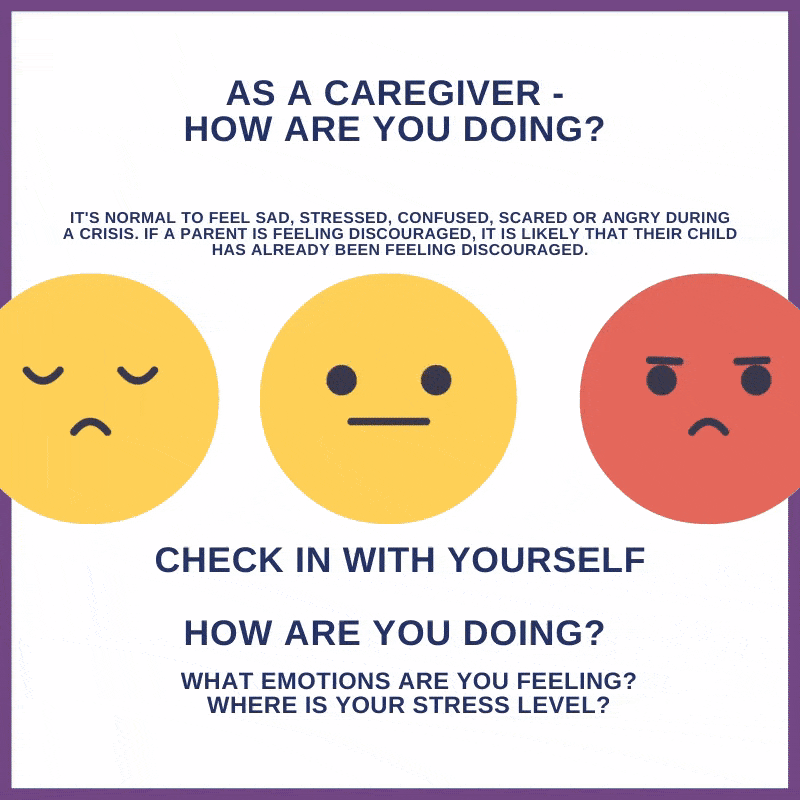Hey caregiver, yes you- whether you are a parent/caregiver by birth, adoption, marriage, foster care, kinship/guardianship, or work with children…stop just a moment.
- Breathe (seriously, stop reading and take a slow deep breath…or 3!)
- Check-in with yourself to see how you’re doing.
- What emotions are you feeling? Where is your stress level?
Being a parent or caregiver is one of the most amazing and challenging roles a person can ever have…and some days, it can feel more challenging than amazing!
It would be great if an infant could say, “Excuse me, but I have a gas bubble in my stomach, and my diaper is wet, can you please assist me, so I feel better”…but instead, they cry. An infant feels scared and overwhelmed without fully understanding what is happening.
It is up to parents and guardians to figure out what their child needs (no pressure!). As our children get older, they learn how to communicate. Sometimes they tell us what they need or what they think they need. But even older teens can have trouble communicating their thoughts and feelings, and often we end up only seeing (and focusing on) the behaviors instead of the emotions, needs, and goals behind the behaviors-which sometimes the child is not aware of either.
“A misbehaving child is a discouraged child, ” Alfred Adler
If a parent is feeling discouraged, it is likely that their child has already been feeling discouraged.
It is important to know and remember that a child’s brain development plays a big part in understanding and processing their feelings and the world around them. The prefrontal cortex, which helps a person think through situations and choices, takes longer to develop (usually not until 24 to 26 years old!) than the emotional processing parts of the brain like the amygdala. Children are not ‘wired’ to know how to deal with big emotions…and childhood is full of lots of emotions! So a huge role caregivers can have with children is teaching and modeling positive ways to handle all kinds of emotions.
Remember, emotions don’t get anyone in trouble, but the choices we make when we feel strong emotions can. We don’t want to stop a child from feeling and acknowledging their emotions, but it is important to set boundaries to appropriate behaviors in response to those emotions. We can’t “control” our emotions, but we can choose how we think about a situation and what we do.
Showing empathy and understanding to our child can help them identify their own emotions, as well as identify and show empathy to the feelings and needs of others. BE PROACTIVE! The more we build our relationship with the child/children in our care, communicate about feelings, and have fun together, the more prepared we can be to deal with big emotions when they occur.
During this time, it is essential to think about the trigger we have as parents and those that are children may have to stressful situations. Talking through these are co-parents, or a family helps determine which actions are appropriate to express our feelings.
What are some triggers for parents during this time?
In addition to the regular stressors of providing care for the child/children you are raising, families are facing additional challenges during this time, including a global pandemic, shelter-in-place orders, online school, and lots of time together. Parents and caregivers are facing additional worries, like the possibility of getting sick or having someone we care about get sick, keeping our children safe while also helping to keep them entertained, balancing work (or unemployment) with family life and responsibilities, and being able to provide for our children. And all this is in addition to the ongoing triggers for parents, which can include our child’s behaviors and emotions, responsibilities of home and schoolwork, and family members getting along.
How can parents identify their triggers? Or triggers for their kids during stressful situations?
If during or after a situation, you find yourself feeling upset, stressed, discouraged, sad, frustrated, or angry…then something about that situation might be a trigger for you. But that doesn’t mean there isn’t something you can do about it!
The more you know yourself and are aware of your thoughts and emotions, the better chance you have in recognizing what your triggers are. And, the sooner you acknowledge your emotional state, the better you can do something proactive instead of reactive.
For example, if you know you feel more stressed and short-tempered when you or your child gets hungry, you can try to be proactive and eat or pack a snack to help manage emotions and your responses to your child. If you don’t like being stuck taking care of all the responsibilities (and feeling underappreciated or taken advantage of), then you can proactively involve family members in dividing up age-appropriate chores not only to more fairly share responsibilities, but to also help teach everyone about teamwork and life skills.
The more you know your child, the better you are at recognizing their emotional state and potential triggers and helping them to be aware of their emotions and needs for themselves.
“A child needs encouragement like a plant needs water,” Rudolf Dreikus.
Everyone needs encouragement, especially parents and caregivers. So ask yourself:
- How, as a parent/caregiver, have you encouraged your child/children today?
- How have you felt encouraged today?
If you have trouble responding to either or both of those questions, it’s worth talking about and coming up with an encouragement plan!
What are some ways to decompress?
There are lots of great ways to decompress, and there are also some unhealthy ways people try to cope with stress.
Some healthy ways are making time to do things that you enjoy, either alone or together with your children: like being outside, going for a walk, gardening, baking/cooking, listening to music, dancing, being creative (drawing, painting, building or making something), watching a movie or playing a game (I encourage you to think beyond video games too- lots of great card and board games, as well as outdoor activities).
Unhealthy ways to cope with stress are anything that could put you or someone else at risk- it may seem like it is ‘helping’ in the moment, but it may have negative long-term risks. And remember, often, the best form of teaching is through our actions. If you are using an unhealthy coping style that you would not want your child to do (example- drinking, drugs, unhealthy eating), then it is worth exploring healthier options to deal with stress.
If you aren’t decompressing, managing your stress, and practicing self-care, then you are more likely to react negatively to your child. I often reflect on what lessons my children are learning from me even when I’m not actively trying to teach them something, and I am reminded of Stephen Sondheim’s lyrics in “Children Will Listen” from the musical Into the Woods.
How can you support a friend or neighborhood parent feeling stressed?
You may have heard the adage, “It takes a village to raise a child.” Still, sometimes parents and caregivers, especially single parents, can feel very alone in their role and responsibilities. Everyone needs a break to ‘recharge,’ but this can be challenging for single parents.
You are NOT ALONE! (Even when physically distant from others!)
Now, more than ever is a great time to check in with others about their stress level and how you could be of any help. Be a listening ear. Offer encouragement. Offer to pick up groceries. Make a meal to drop off. Use a phone or computer (video calls) to read a story to a child. And, when the shelter-in-place order is lifted- offer to watch a child for a parent to have a break.
Best mantra for a parent to remember during this time?
One of my favorite reminders as a parent to say to myself is, “Be Patient, Be Present!” and I will often say this in my head as I take a deep, calm breath before responding to my children. Notice, I again use the word “respond” instead of “react.” A response is intentional and thought out. A firefighter wouldn’t run up and throw gasoline on a fire they were trying to manage, but I have seen so many caregivers inadvertently escalate a child’s emotional state by reacting with big emotions of their own.
I think it is essential for parents to remember and help their child understand, those big emotions, like storms, come and go, and we can be like meteorologists in predicting patterns and ‘taking shelter’ when necessary until things calm down. Safety and calming down should be the primary focus before being able to process with a child.
A colleague of mine told parents to imagine their child has an “Under Construction” sign flashing over their head to remind parents that their child’s brain development was still very much under construction- not to be an excuse for behaviors or reactions, but to help keep perspective and remember parents’ roles to help teach and prepare their child. “Breathe! This is a teachable moment!”
“Don’t take it personally!”- I know this can feel SO HARD sometimes- but remember, kids, aren’t born knowing how to express emotions and communicate their needs in the best ways…they learn this; kids also test limits (kids will quickly discover if crying, screaming, or having a meltdown will result in getting them what they want).
Self-care and getting extra help when needed
I was 19 the first time I was ever on a plane. During the preflight instructions, I remember the flight attendants holding up the oxygen masks to demonstrate how to put it on “in case of the unlikely event of a sudden loss of cabin pressure.” And then the instruction, “secure your mask before helping others, including any children that may be traveling with you…”- I wasn’t a parent yet, but I remember this sounding bad. Why wouldn’t a parent make sure their child was taken care of first? But if a parent doesn’t make sure their mask is secure, they could end up passing out before ever being able to help their child.
Caregivers often feel it is “selfish” to take care of themselves, but if you don’t practice positive self-care, then how can you expect to fully be able to take care of your child…or recognize when more help is needed?
Some people feel embarrassed or judged if they seek help- but we all have limits, and knowing that, and getting extra help, is very wise. You wouldn’t want to wait until your car ran out of gas to fill up, and you wouldn’t want to wait until the engine locked up before getting an oil change…and you don’t have to wait until there is a crisis to get extra mental health support as well!
There are counseling resources for parents and children/teens. Youth Focus, part of Alexander Youth Network, can help!
The core principals of parenting haven’t changed, but today’s world is different than the one you grew up in. Our children are facing different challenges than we did, and we need to adapt our parenting to best help and prepare them for growing up.
If you haven’t been the type of caregiver you want to be for your child, ask for help. Consider counseling or attending a group, like the Strengthening Families Program.
Things can always be better…but we sometimes first have to learn new skills! As Maya Angelou’s quote says, “I did then what I knew how to do. Now that I know better, I do better







